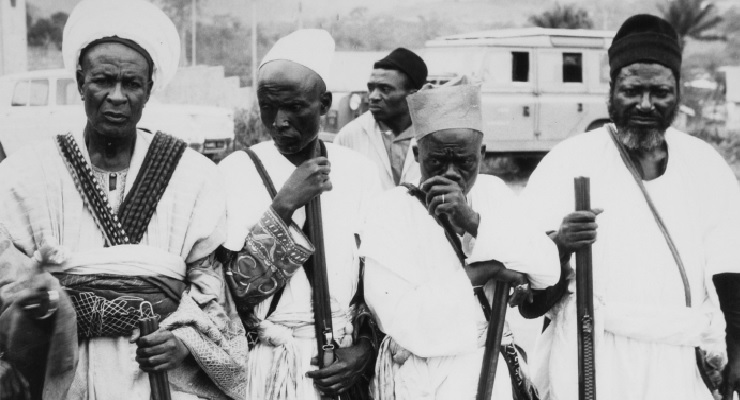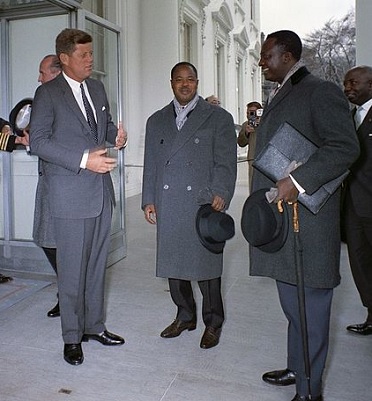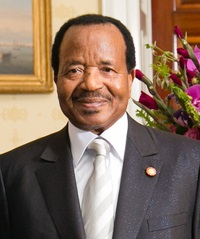
I cannot think of any country in the world today that does not celebrate a national day. Let us look at this definition from Wikipedia:
“A national day is a designated date on which celebrations mark the nationhood of a nation or non-sovereign country. This nationhood can be symbolized by the date of independence, of becoming a republic or a significant date for a patron saint or a ruler (birthday, accession, removal, etc.). Often the day is not called “National Day” but serves and can be considered as one. The national day will often be a national holiday. Many countries have more than one national day” (cf. ).
The West African country called Cameroun celebrates its own national day on 20 May every year. Based on the definition above and using a politico-historical narrative, let us look at why that day is celebrated in that country as a national day. Our findings should also lead us to assess the moral, politics and significance of that day as a national day for Cameroun.
Cameroun vs. Cameroon
The United Nations Resolution (UNRES) that recognizes the country that officially styles itself today using the English appellation “The Republic of Cameroon” is UNRes 1476(XV) of 20 September 1960. This resolution clearly names this country as “THE REPUBLIC OF CAMEROUN”. Therefore even in English the international community knows present day Cameroon as CAMEROUN, with a “u”.
The appellation in French is “La République du Cameroun” (LRC) still with a “u”. Worth noting is that this Resolution was adopted first to recognize that the former French Colony in French Equatorial Africa (AEF) known as French Cameroun (FC) did gain independence on 01 January 1960 to become LRC. Second it was adopted to admit LRC into the concert of nations and to recognize its territorial boundaries and sovereignty before all nations of the world. These territorial boundaries as gained by LRC at independence are considered immutable by the African Union (AU).
The maps filed to the UN on that 20 September 1960 show a territory that excluded neighbouring British Southern Cameroons (BSC).
Storm Clouds in British Southern Cameroon
On 11 February 1961 the UN imposed a plebiscite on the people of BSC forcing them to vote to “gain independence by joining the independence” of either the Federal Republic of Nigeria (FRN) or of LRC. The people of BSC voted unsuspectingly to join LRC to create a Federal Republic of Cameroon (FRC). Due to certain irregularities and dishonest maneuvers, LRC imposed a modification of its constitution of 04 March 1960 as the Federal Constitution for the new entity called the FRC that would be formed when BSC would gain independence on 01 October 1961.

However, LRC had no intention of treating BSC as an equal partner in the new union and therefore decided that the Federal Constitution was merely a modification of its 04 March 1960 Constitution. The new Federal Constitution meant for LRC that she, LRC, was simply taking over BSC an renaming it “West Cameroon” together with her (LRC) as “East Cameroon” in her (LRC’s) newly expanded territory called FRC.
To prove that she meant business, the First President of LRC, Ahmadou Ahidjo (of late), signed the Federal Constitution alone making nonsense of the prerogatives and powers of the Premier of BSC, at the time John Ngu Foncha, as leader of Government Business of BSC.
How John Ngu Foncha allowed this to happen is really difficult to understand, but not impossible to explain, but of no consequence because it is clear that the manipulation by Ahidjo was in contravention to Resolution 1608 (XV) of 21 April 1961 granting independence in a union with LRC and therefore requiring the presentation of the Terms of Union to the UN Secretariat according to UN Charter article 102.
No such treaty exists today at the UN Secretariat.
Ahidjo on the Move
From 01 October 1961 Ahidjo took over control of BSC and flooded that territory with his army. The British participated in this annexation by handing over the instruments of power over BSC to Ahidjo on that day, instead of handing them to Premier Foncha.
Ahidjo had no intention of allowing BSC to have even minimal autonomy for a long time. As such in May 1972 he unilaterally called for a referendum to abolish the Federation in favour of a centralized unitary state. This was in contravention to article 47 of the already illegal Federal Constitution.
Ahidjo made sure that his sole “oui” and “yes” options won 99.99% of the votes. He also made sure to organize the referendum on the whole territory thereby further forcing the will of LRC aka East Cameroon on BSC aka West Cameroon.
Ahidjo’s argument for this referendum was that Federation was equal to division and disunity and that for unity’s sake the federation must end in favour of a centralized system of Government that would give the President, him Ahidjo, all the powers to make decisions unopposed.
That was the rationale for his 20 May 1972 referendum. To show how spiteful he was to the people of BSC he made sure to organize the referendum on 20 May 1972 when that precise day, a 20 May, is the birthday of his still living wife Germaine Ahidjo. Therefore Ahidjo made of BSC a birthday gift to his wife, Germaine Ahidjo.
The name of the country born of the 1972 referendum was the United Republic of Cameroon (URC). In this new configuration, still not registered at the UN Secretariat, Ahidjo divided BSC into the North West (NW) and South West (SW) Provinces, later called Regions under Paul Biya.
In 1982 Ahidjo resigned from power and through prior amendments to the again fake URC unilaterally drafted constitution, he appointed Paul Biya, who was his Prime Minister since 1975, as President.

In February 1984 Biya unilaterally decreed by decree 001 of 04 February 1984 a change of name of the country from URC to LRC giving the flimsy excuse that the country was already united so no need to have the word “united” in the official name. In so doing, Biya simply reverted to the name FC had at her independence in 1960.
This plan to swallow BSC had been well thought-through by LRC. LRC had never wanted nor recognized the independence of BSC. LRC voted against Resolution 1608 (XV) of 21 April 1961. It was only normal that she should manipulate the whole process until returning to its original name so as to force the UN to recognize in UN Res 1476 (XV) a modification of her territory to incorporate BSC. The UN did not hand over BSC to LRC under UN Resolution 1476 (XV). Can the UN or LRC therefore explain how LRC incorporates BSC without a Treaty of Union?
However, the purpose of this article was to enlighten DC readers on the morals, politics and significance of the so called 20 May National Unity Day (celebrations) in Cameroun. This historical approach should make the world understand the following about 20 May celebrations in Cameroon:
- On this day, 20 May, each year since 1972, the people of LRC celebrate a faulty political philosophy that argues that Federalism is equal to disunity;
- The day LRC took the second step towards the annexation of BSC after the manipulations of 1961. The first step was taken in 1961 and LRC duly completed the annexation of BSC in February 1984;
- On this day, 20 May, each year since 1972, the people of LRC celebrate the birthday of the wife of Ahidjo, Germaine Ahidjo practically by force;
- On this day, 20 May since 1972, the people of BSC have to remember or commemorate the day they were gifted to LRC and to Madame Germaine Ahidjo;
- On this day, 20 May, each year since 1972, the people of BSC contemplate 56 years of enslavement and annexation.
- On this day, 20 May, the UN silence on the situation in Cameroun signals an endorsement by this world body of illegality and black on black enslavement of the people of BSC.
The historical narration in this article should allow the reader to make their own objective assessment of whether these conclusions have weight and whether indeed the day called in present day Cameroun as 20th May National Day Unity is indeed worthy of that appellation of “National Day”. The reader should recall the definition of “national day” by Wikipedia as given above and ask himself/herself the following questions: Even if this day were to celebrate “unity” should this be grounded on a lie that Federalism = Disunity? How can unifying be done on such grounds and with the agenda of unjustly annexing the helpless people of another territory in pure disrespect of UN Law? Even if a national day can fall on a birthday, shouldn’t that birthday be for a major national hero for example? On what grounds is Germaine Ahidjo so important as to have a whole national day on her birthday? Simply for being Mr. Ahidjo’s wife? Therefore, globally, should a national day be celebrate based on lies telling?
You may ask yourself as a DC reader why this article is even important. Why should you know these issues about the LRC?
Well, DC readers are interested in politics.
They are therefore interested in how governance is taking place around the world. Whatever the motivation behind that interest, be it for scholarly reasons or simply for passion or for knowledge acquisition, this article would interest the political mind in that it gives you information about how governance and politics occur in Africa in general and LRC in particular.
One begins to understand why Africa is lagging behind in terms of things like democracy, good governance, sustainable peace, human rights, and development; on reason is that basics like Constitutions are hijacked by a clique thereby creating a cycle of uncertainty and violence. LRC is currently in this situation since the Anglophone community, i.e. the people who live in the NW and SW regions, regions concomitant with the BSC, have been protesting their annexation for decades and the situation has escalated again since October 2016 till date.
Today 20 May 2017, the people of the BSC have boycotted 20 May celebrations by observing Ghost Towns in all villages, towns and cities in BSC territory or todays NW and SW Regions in LRC. And there are voices among them that are signaling intentions to take up arms to fight for their liberation since UN has been mum on addressing their calls for the restoration of their statehood since 1961. What is the UN really doing? Despite all the signs of the possibility of genocide in BSC the UN has not expressly addressed the problem of the people of the former Trust Territory of the British Southern Cameroons.
Leave a Reply